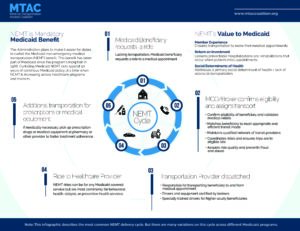About NEMT
Non-emergency medical transportation or NEMT is a service that delivers people who lack access to transportation to their necessary but non-emergent medical appointments. These appointments are wide-ranging, but some of the most commonly accessed services include:
- Dialysis for persons with advanced kidney disease, a service typically needed three times a week
- Mental and behavioral health appointments
- Substance abuse counseling and treatment services
- Primary care or specialist visits
- Physical therapy or other forms of rehabilitation
NEMT has long been a staple of the Medicaid program for beneficiaries in need of health care services who have no other means of transportation. States have flexibility in designing and implementing their NEMT benefits, including how they are managed to achieve optimal impact at the lowest possible cost.
Many states have turned to specialized transportation brokers that are tasked with managing access to this service for all or part of a state’s Medicaid population. A number of economic studies, including a cost estimate by the Congressional Budget Office (CBO), have found that broker-managed NEMT services help effectively manage costs while preventing fraud and abuse in the program.
In addition to Medicaid beneficiaries, Medicare managed care plans that participate in the Medicare Advantage program are increasingly offering medical transportation benefits to their beneficiaries, recognizing that access to transportation results in improved beneficiary health outcomes and lower costs.
New Infographic on Medicaid NEMT Illustrates How Benefit Serves Health Care System
This downloadable, printable infographic describes how the Medicaid NEMT benefit is operationalized under a typical delivery model scenario. The infographic is intended to be a resource to policymakers and stakeholders, and we encourage sharing the infographic broadly, including on social media. The infographic can be downloaded by clicking here.

